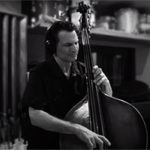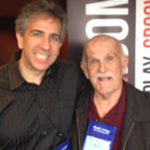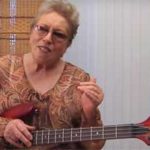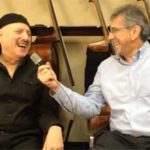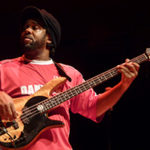Italian-bred bassist opens up about his experiences with the U.S. jazz scene and Broadway
Exclusive interview with FBPO’s Jon Liebman
February 1, 2021
For the last two decades, Marco Panascia’s presence in the jazz world has been nothing short of magnifico. Equally at ease on the upright and electric bass, the Italian-born bassist has played in the bands of a slew of contemporary jazz greats, including Kenny Barron, Kevin Mahogany, Natalie Cole, Dado Moroni, Tamir Hendelman, and David Kikoski. Over the years, he’s also worked with artists like Herbie Hancock, Quincy Jones, Bobby McFerrin, Lee Konitz, and Gary Burton. Panascia has been a familiar face at world-renowned jazz events and venues like the Montreux Jazz Festival, The Hollywood Bowl, and the Kennedy Center for the Performing Arts. The bassist is also well known for his collaborations with Eldar Djangirov and appeared on the pianist’s 2008 Grammy nominated album, Re-Imagination.
FBPO: Congratulations on becoming a US citizen.
MP: Oh, thank you!
FBPO: You’ve been in the country for over 20 years now, haven’t you?
MP: Yeah, yeah, 22 years at this point.
FBPO: So you decided you like America enough that you want to stay?
MP: Yeah. I mean, I definitely love this country, and it’s been great for my career. I’m pretty sure that if I stayed home in Italy, chances are that I would have had probably a lot of more home cooked meals and things like that. I miss my mom’s cooking and then my family, but career-wise, there are definitely a lot more opportunities here. I’m really grateful for all the good things that have been happening since I came here in ’99.
FBPO: I want to hear about that, but first let’s go back to the beginning. Tell me about the early days, your initial exposure to music and how you became a bass player.
MP: Well, I started out when I was 8. I started taking classical piano lessons, back in my hometown of Catania in Sicily, Italy. At the time, like most Italian young kids were interested in playing soccer and doing sports and that kind of thing. I was not really that interested in studying the piano that much, but it definitely taught me a lot. I mean, it taught me to read in bass clef, so when I started playing the bass, having a lot of years playing the piano definitely helped. I was able to concentrate more on technique and other things instead of having to add the extra burden of having to learn how to read, so that was good.
FBPO: What attracted you to the bass?
MP: Well, it was random. At the age of 15, 16, a band was being formed with my classmates. A friend of mine was selling this $50 bass with mile-high action, that kind of thing, but I just went for it. At the time I was really into heavy metal and classic rock. I think the first bass line that I played was “Transmission” by Joy Division. It’s this rock/punk bassline, with three notes. I played with the tape, really heavily. And so that was where it all began. And then, about three years later I started getting into Jaco, and he was my connection between different styles. Jaco, as we know, was able to play any style in a legit way. He could play rock and funk and jazz and you name it. So, he was my bridge between rock and jazz, you know? And so, when I was about 19 years old, that’s when I started playing the upright as well. And so, I owe it to Jaco, and I also owe it to John Patitucci, because when I was 19 he came to my hometown for a concert. I think it was his first tour as a leader.
FBPO: John is very proud of his Italian heritage too!
MP: Yeah, definitely! So it was, we’re talking 1990, ’91, something like that. And at the time he was really popular as an electric bass player, playing six-string with Chick Corea, so we all expected him to come up with this big fusion concert. But then he showed up at this concert hall, and it was just [a] trio. It was him just playing upright. He didn’t have an electric with him, and Joey Calderazzo on piano, and Peter Erskine on drums. So that did it for me. As a 19-year-old, it was totally … I couldn’t sleep that night. You know? I was totally in shock. Actually, it’s funny because that day I had my first bass with me, and he signed it. I still have it. My first Ibanez, and he signed it right on that day. So that did it for me. I’ll never sell this bass, because it was so important for my journey. Every time I run into John at festivals or here and there, I always tell him, “Look, I’m forever grateful because you gave me that spark. It made me want to play the upright bass.” So that’s how it happened.
FBPO: What brought you over to America?
MP: I applied to Berklee College of Music in Boston and they gave me a quick scholarship, so I decided to give it a try. I was like, “Okay, I’ll just try it for one semester and go right back to Italy,” because at the time I was studying for a classical bass degree, and I was also studying for a chemistry degree. I thought that my life was going to be different, but there’s that famous song by John Lennon that said that life is what happens when you’re busy making other plans.
FBPO: Exactly.
MP: So I came here. I was like, “Okay, I’ll be here in the U.S. for three months and then go right back to Italy and finish up my degrees.” That was 22 years ago, and I’m still here. One of the most important things in a career, I think, is about being versatile, as musically versatile as possible. So that’s what Berklee did. I mean, I was able to develop my style, my knowledge of different styles and basically do it all.
FBPO: What were the circumstances surrounding your leaving Boston and going to New York?
MP: Basically, at the time when I was a Berklee student, I did a lot of educational programs, like at the Kennedy Center, at Ravinia in Chicago, and for three summers in a row, I was part of this orchestra. It was a school called the Henry Mancini Institute, which was an orchestra that was put together by audition every summer, and I did it three times. Over there, the bass teachers were a great classical teacher named Bert Turetzky, and the electric bass teacher was Carol Kaye, who also ended up being a huge mentor for me. I owe a lot to her, not just for knowledge of music and bass playing, but she was just really caring. And if I got the flu she would call me and check on me if I took my aspirin and that kind of thing. So for three summers in a row, I had a chance to interact with her in LA. And it was not just about the bass lessons. She took me to jazz clubs and introduced me to her colleagues. She introduced me to Earl Palmer and a lot of colleagues that she did so many hit records with in the ‘60s and the ‘70s. So yeah, I’m definitely grateful for all that she’s done for me.
FBPO: What about the music part? What can you share about something you learned from Carol Kaye or Bert Turetzky?
MP: Absolutely! I mean, with Carol, her concept is based on the chordal thing. Instead of focusing her attention on teaching scales and modes and that, she’s more about really trying to learn the harmony and trying to pinpoint the important notes that make up a chord. Which is the real, when it comes to jazz improvisation, to me that’s the real deal. The most amazing phrasing by the greats, Charlie Parker and the great horn players and piano players, is all heavily chord-scale based. So that’s basically what she really tried to work on and get a grasp on. That was the most useful thing of all.
FBPO: Lots of thirds and sevenths, eh?
MP: Absolutely! Yeah, yeah. Just playing arpeggios and really trying to understand how most of the classic bebop phrasing is based off of that, more so than just playing a scale up and down the neck, that kind of thing.
FBPO: How did you manage to break into the New York music scene? That’s no small feat.
MP: Well, the official excuse for me to move here was that I applied to for a master’s degree in Manhattan School of Music, and they gave me a full ride. So I definitely had a good incentive to make the move.
FBPO: Was Harvie S there at the time?
MP: Yeah, he was. He was definitely a great teacher. I also studied with Jay Anderson. And even though it was a performance degree for me, a master’s degree, there was a lot of emphasis on writing. I worked a lot on Dave Liebman’s assignments, your namesake, another great saxophone player. I don’t know if you guys are related.
FBPO: We’ve tried to trace it back but we could never find any common ancestry. Finally, one time I said, “Well, from now on when people ask me if we’re related, can I just say yes?” He says, “Yeah, sure. Yeah!”
MP: [Laughs] Basically, that official excuse of getting a master’s degree brought me to New York. I got here in 2002, and after I graduated in 2004, I started freelancing a lot in town. I was playing a lot of gigs and then I got hooked up with this young pianist named Eldar Djangirov. He was a prodigy pianist who was born in Kyrgyzstan and he moved to the U.S. when he was 11. When he was 15 or 16 years old, he got his first record deal for Sony, and the record featured John Patitucci and Michael Brecker. A lot of superstars. And so, he had this record out and he had to just start touring. He put a band together and I ended up being part of it. We toured all over the world in four continents and we recorded another album, which was nominated for a Grammy. And so, that was about two, three years of my life. We did a Live at the Blue Note for Sony with Roy Hargrove as a guest. It was definitely a great experience, and it took me all over the world. And it got my name out there more and more, both in New York and internationally.
FBPO: You’ve played with a lot of people. Obviously that exposure did you well. You’ve played with so many notable artists crossing over several different musical genres.
MP: Yes, that’s right. I’ve been blessed to play with so many amazing artists, not just in the jazz world. I mean in the jazz world, I was especially grateful to work with the great Kevin Mahogany, [he] was a great singer who unfortunately passed away a few years ago. Eric Reed, Kenny Barron, Tamir Hendelman. I mean, it’s a long list of great musicians that all taught me something really valuable musically. But as much as I love jazz, it’s always going to be my first love, I’ve always tried to be as musically versatile as possible. And also in terms of the instrument of choice, if people asked me, “What do you love more? Do you love the upright bass more, or the electric bass more?” I really wouldn’t be able to pick one over the other because I love both equally. It’s like a 50/50 percent deal, you know? So the fact that I love to play both instruments has helped me in a lot of ways, to branch out of just a straight ahead jazz world. And the thing that my versatility has helped me with, was over the past couple of years I’ve gotten really busy suddenly on Broadway shows.
FBPO: I’ve always loved doing that kind of work.
MP: For me, the Broadway world definitely has a major allure, because I live within a five-minute walk of all the theaters here in Times Square. I mean, if I see out my balcony, I can basically see Times Square. So, it’s great to be able to walk to work and be at the theater in eight minutes flat, door to door. And also, the thing I love about Broadway is that most shows require doubling, both upright and electric. So it’s a really amazing thing, a really amazing way to keep your chops up on both instruments. The problem that I was having when I was playing 90 percent straight-ahead jazz was that everybody just wanted me to play upright. And so sometimes, a month or two would go by without me being able to bring the electric on a gig. And that was something that really frustrated me, because of the love that I have for both instruments. So Broadway is great because it forces me to keep my chops up on both instruments. There’s definitely been a lot of memorable moments. Subbing on The Lion King, for Tom Barney and Frozen, another Disney show, for Michael Olatuja. And I can’t wait for the Broadway scene to be back, after the pandemic is done and over with, so I can get back to doing my thing, you know?
FBPO: What’s keeping you busy in the meantime?
MP: Well, right before the pandemic, other than Broadway and just freelancing with jazz gigs here and there, I did this tour on electric bass with this trio of young vocalists from Italy, Il Volo. They’re sort of young Bocellis, in a way. It’s a mixture of opera stuff, think Pavarotti, and more pop-oriented stuff. We basically sold out a lot of major venues. MP:
We were in Detroit as well, at the Fox Theater actually. It was pretty awesome. What an amazing theater there.
FBPO: Yes, it is! I’ve played there a bunch of times.
MP: And then we played at Radio City Music Hall. So that was a nice three-week tour, where we played all these great venues. The tour ended around February 20th and nobody knew what was going to happen, but then less than a month later, we’re all stuck at home. So basically during the pandemic what’s been going on over all these months, it’s been first of all, trying to keep my chops up on both instruments, because I want to be ready for when life goes back to normal. And also MarkBass that I endorse, I usually play at their booth at the NAMM show. But, this year NAMM is going virtual. So they asked all their endorsing artists to make a 15-minute video for them to be part of this virtual NAMM thing, you know.
FBPO: Tell me about the rest of your gear.
MP: When it comes to electric basses, I have a lot of Fenders, a lot of vintage. I have a ‘66 P, a ’69 P, a ’73 P, then I recently found this Scroll bass. I don’t know if you’re familiar with them. They’re these really weird basses with supposedly no pickup, but the pickup is actually under the bridge. They’re sort of the electric bass version of the Baby Bass, that’s more familiar. So I’ve been having a lot of fun with that. And also, I have a bunch of basses, custom basses made by Mike Lull, the great maker from the Seattle area who unfortunately passed away last year.
FBPO: What kind of strings do you play?
MP: For electric, I play the strings by this company from Italy called IQS, and I’m really, really happy about them. I generally stick to nickel plated. I mean, I love the sound of steel strings, but somehow I find them a little too harsh. I like a more vintage or a mellower vibe. So nickel does it better for me, even though they, of course, they go dead faster than steel strings and all that. But that’s the sound that I’m going for. And also, I have a few basses with flats, because when you have a vintage P bass, you just got to have flats on it.
FBPO: What about on your uprights?
MP: For upright bass strings, I’ve been experimenting with these great strings by Kolstein, the Heritage. They’re really, really great.
FBPO: I know! have them on my upright.
MP: Oh, beautiful. They’re great strings. I mean, of course they’re really nice because they have the snap of gut, but at the same time they’re warm and very playable like metal strings. Barrie [Kolstein] is a really, really good friend of mine. We check in with each other all the time, and I’m really, really grateful for everything that he’s done for me over the years.
FBPO: What advice can you impart to somebody who wants to learn bass?
MP: I think the most important thing is to, first of all it’s important to pay attention to just taking care of the fundamentals. So, if we’re talking upright, it’s very important, even if they’re not going to be career classical musicians, it’s really important to practice with the bow at least half an hour a day, which is something that I do myself to this day. Because, when you are playing the upright with just pizzicato style, just plunking it, if you’re playing slightly out of tune, you’re not really going to notice that much because the note tends to die right away. It doesn’t have a lot of sustain. But if you’re playing with the bow, you’re really going to be able to acknowledge whether you’re playing in tune or not, so this is part of the fundamentals. I mean, really making sure that your intonation is spot on. Also playing with the bow gives you a lot of discipline and a lot of great knowledge about the instrument and the fingerboard itself, so it’s something that I really recommend to all bass players, regardless of whether they want to have a career as classical, orchestral bassists or not.
FBPO: Any advice specifically for electric bass players?
MP: Yeah. Well, it’s the same deal. I mean, we don’t bow on the electric bass…
FBPO: Victor Wooten does!
MP: Right! That’s right. You got me on that one! But no, same deal. It’s really about really stressing the fundamentals, so make sure that you have your scales and arpeggios down, and most of all being able to finger stuff in any part of the fingerboard. One mistake that I used to make on electric was that I would only … I adopted this upward thing, where I would play across the four strings low and then do everything on the G string. And then I realized how important it is to play vertically across the neck. If I’m playing a D, it’s important to know that you can play that D on the 10th fret of the E string. And so you can go vertically and do a whole scale, an octave and-a-half without shifting, as you would have to, if you played that D on the fifth fret of the A string. So, little things like this. On the electric, it’s definitely something that can be done easily because there’s nothing in the way. So I really encourage my students and whoever is asking for advice to really use all the four strings of the bass and go in vertically as opposed to shifting. And also one thing that I would really recommend, other than sticking to the fundamentals, is making sure that music is the most important thing of all, more so than technique and everything. I mean, technique is important because it allows you to execute whatever musical idea you have in your head. If you have good technique and good knowledge of the fingerboard of the instrument, you can immediately translate it into notes as opposed to fumbling and trying to figure out where to play the stuff. So that’s important. But when we get that out of the way, it’s important to really focus on making music, by ourselves and with the other musicians that we’re playing with.
FBPO: What would you be if you were not a bass player?
MP: That’s a tough one. I guess I would be either a photographer or a software developer.
Visit Marco’s website here.
See Jon’s blog, with key takeaways from this interview here.

